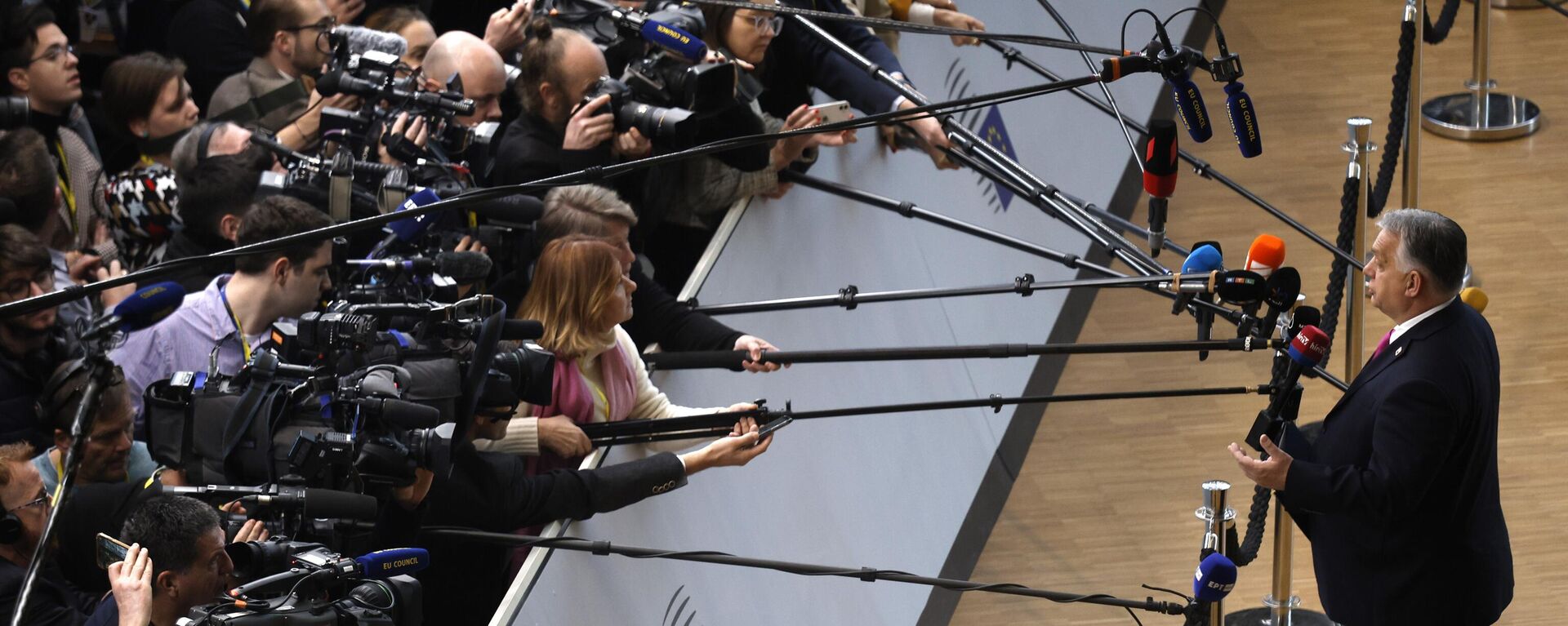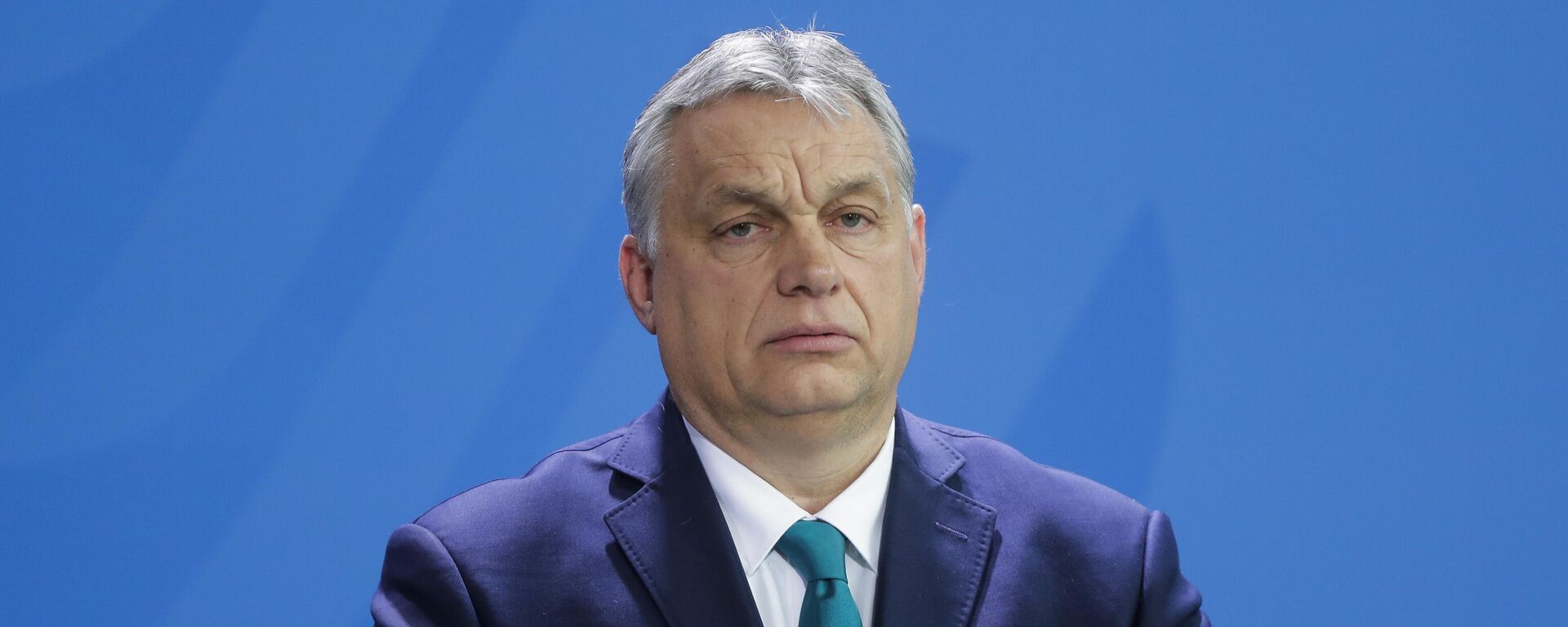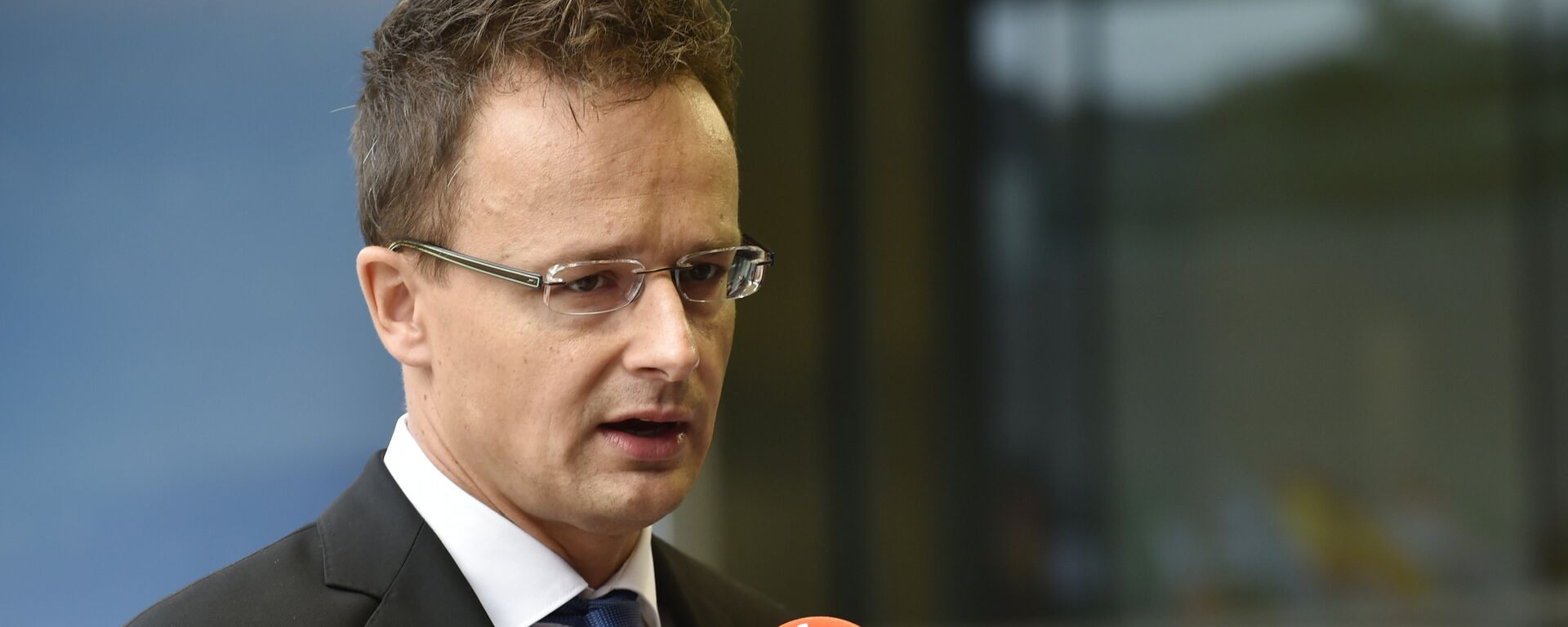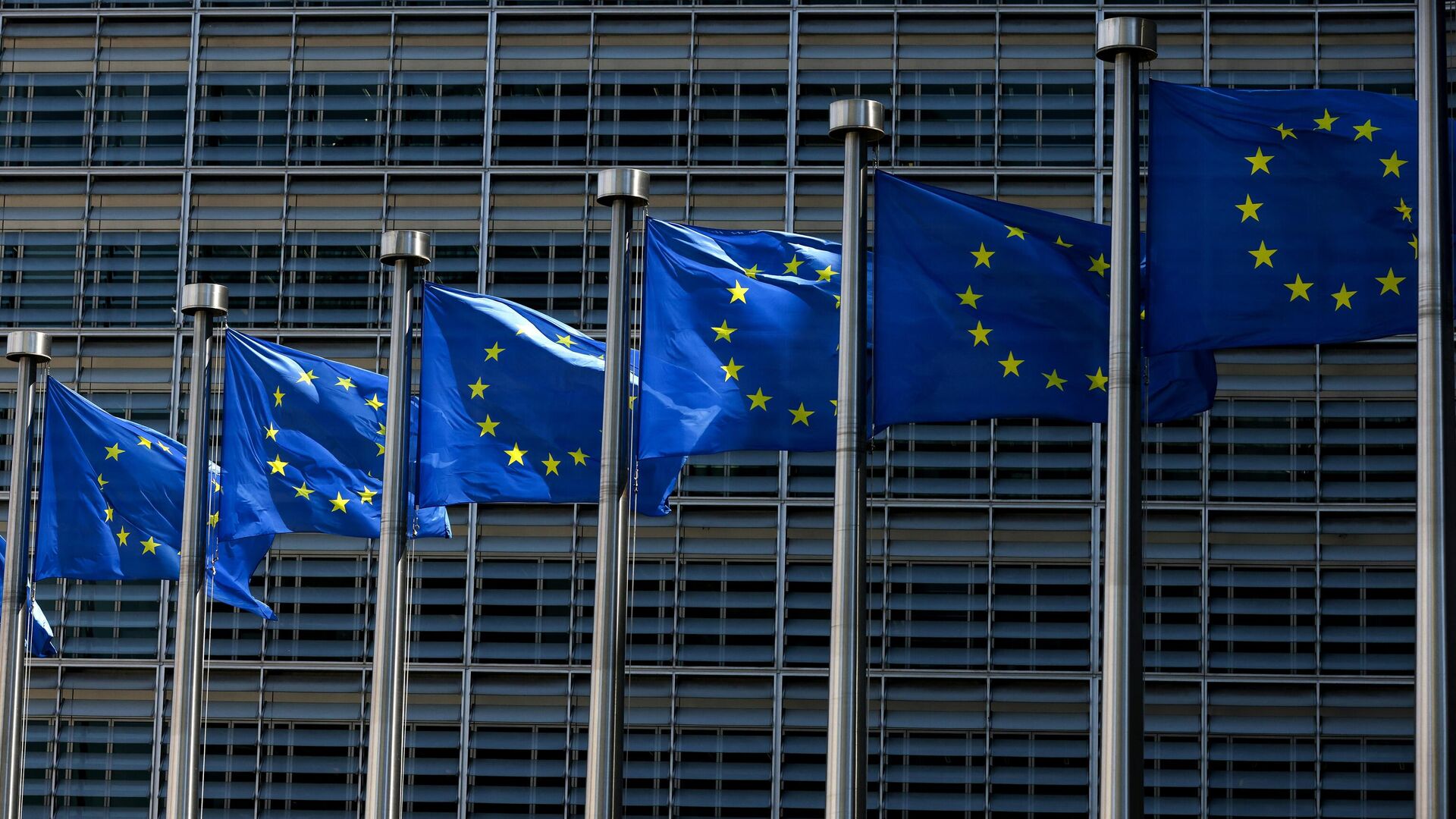https://sputnikglobe.com/20231223/dipping-into-esm-to-bankroll-ukraine--bypass-hungarys-veto-will-weaken-eu---analyst-1115761819.html
Dipping Into ESM to Bankroll Ukraine & Bypass Hungary’s Veto Will 'Weaken EU' - Analyst
Dipping Into ESM to Bankroll Ukraine & Bypass Hungary’s Veto Will 'Weaken EU' - Analyst
Sputnik International
Dipping into the European Stability Mechanism (ESM) to bankroll Ukraine and bypass Hungary’s veto will only serve to weaken the European Union, Gabor Stier, foreign policy senior analyst, told Sputnik.
2023-12-23T07:42+0000
2023-12-23T07:42+0000
2023-12-23T07:42+0000
hungary
viktor orban
european union (eu)
european stability mechanism (esm)
analysis
https://cdn1.img.sputnikglobe.com/img/07e7/0c/17/1115761426_0:161:3070:1888_1920x0_80_0_0_20a7feeabf1fc7b28027bb2acb2c6193.jpg
Dipping into the European Stability Mechanism (ESM) to bankroll Ukraine and bypass Hungary’s veto is highly problematic, Gabor Stier, senior foreign policy analyst at the conservative Hungarian daily Magyar Nemzet, told Sputnik. These funds are a "last resort," and such a step will only serve to weaken the European Union, he emphasized.“This fund was created in 2012 in order to ensure the competitiveness and viability of European states and European economies in difficult times… And because of this, if they want to use this fund to financially support Ukraine, then this is problematic. The European Union is already experiencing a systemic crisis, a severe economic crisis. The competitiveness of the European economy will suffer as a result,” underscored Stier, who is also a member of the Valdai Discussion Club.Earlier, Olli Rehn, the governor of the National Bank of Finland, suggested overriding Hungary’s veto on financial assistance to Ukraine by using the rescue fund as a "Plan B." Olli Rehn, who is also former European commissioner for economic affairs, noted that funds from the ESM could offer a backup plan for providing long-term assistance to Kiev.“We don't have an urgent need for a bailout fund in the financial markets, but we have a deep urgency, an existential urgency in Ukraine. This is a question of freedom, democracy and the defense of Europe," Rehn was cited by media outlets as saying.He added that he was "very concerned about the disunity in Europe and Hungary's veto," saying that "the other 26 EU member states must get together quickly and prepare a plan B without the consent of Hungary, which seems to be going its own way."The European Stability Mechanism (ESM) is a permanent rescue fund established in 2012. At the time, an international agreement was signed by 17 Eurozone countries. Currently, there are 20 ESM and euro area member states. The purpose of the ESM is to provide loans to financially distressed euro area countries. The assistance is granted in cases when it is imperative to safeguard the financial stability of the entire Eurozone and of each euro area country. The ESM has a total capital of €708.5 billion: around €81 billion in paid-in capital provided by ESM Members, and close to €627.5 billion in committed callable capital. Callable capital constitutes an obligation for or promise by shareholder governments to provide capital if ever needed. The ESM raises the full amount of loans by issuing bonds, bills, and other instruments. ESM member states make a contribution to the ESM’s paid-in capital, which is invested in assets.Now the European Union will try to help Ukraine with loans, he said, recalling how after the COVID-19 pandemic, European countries, except for Poland and Hungary, received money partly as aid, and partly as loans. “If, in addition to this, there are some other decisions about loans, then where does this lead? This is already completely weakening the European Union. Who benefits from this? Even opponents of the European Union will not stand to gain from this, I believe.”As for which EU countries will suffer the most if the EMS funds allocated to them are redirected to Ukraine, the expert suggested that the less wealthy ones would be impacted. “First of all, those countries that have less money, those that rely on EU funds,” said Stier. Hungary has first-hand experience of this, after its funds were frozen.According to the pundit, the European Union appears to be determined to disregard common sense. “I also see that the United States wants more and more for the European Union to finance Ukraine. If the Western world, the Western bloc, thinks that we should finance Ukraine, support it, and so on, then everyone should do it. But now I feel that more and more this will be the task of the European Union. This also weakens the European Union. Of course, this is not entirely bad for the US,” the foreign policy analyst speculated.Despite “Ukraine fatigue” increasingly manifest both in the US and in Europe, there is a group of countries still determined to prop up the Kiev regime, Gabor Stier pointed out. These are mainly the Baltic states, Poland, Scandinavian countries, partly the Netherlands, and Finland has recently begun to participate in this group, he said. However, there are EU member-states that “feel this is a trap… that this is a dead end… but cannot do anything,” Stier said. For these countries, such as Austria and Slovakia, it was even expedient that Viktor Orban resorted to the veto, because although they may be inclined to share Hungary’s stance, they vote like the majority in Brussels.“Is anyone seriously thinking about the future of the European Union when they scramble about to find ways of pushing the Ukraine funding through without Hungary?” Stier queried. “We are all in the same EU boat, and if there are problems, you can expect there to be also problems in Hungary, in Germany, in Finland, it doesn’t matter where you live,” he pointed out, adding: "We need to think more seriously and responsibly about the future of the European Union.""Realpolitik is lacking in the European Union, as are independence, sovereignty. That is why I say that the European Union is experiencing a systemic crisis... If security collapses in the European Union, then it will be a problem for the entire continent," the analyst said.
https://sputnikglobe.com/20231218/eu-may-strip-hungary-of-voting-rights-in-bid-to-force-ukraine-funds-1115662006.html
https://sputnikglobe.com/20231215/hungary-vetoes-50bln-euros-in-eus-macro-financial-aid-for-ukraine-1115597288.html
https://sputnikglobe.com/20231004/unfreezing-136bln-of-funding-for-hungary-not-connected-to-eu-budget-changes-1113932869.html
hungary
Sputnik International
feedback@sputniknews.com
+74956456601
MIA „Rossiya Segodnya“
2023
News
en_EN
Sputnik International
feedback@sputniknews.com
+74956456601
MIA „Rossiya Segodnya“
Sputnik International
feedback@sputniknews.com
+74956456601
MIA „Rossiya Segodnya“
macro-financial aid for ukraine, hungarian prime minister viktor orban, hungary's veto on ukraine aid, hungary's veto on european stability mechanism, hungary vetoes eu's macro-financial aid for ukraine
macro-financial aid for ukraine, hungarian prime minister viktor orban, hungary's veto on ukraine aid, hungary's veto on european stability mechanism, hungary vetoes eu's macro-financial aid for ukraine
Dipping Into ESM to Bankroll Ukraine & Bypass Hungary’s Veto Will 'Weaken EU' - Analyst
The flow of money to Ukraine is increasingly under threat of drying up on both sides of the Atlantic. In the US, Congress will run out of Ukraine funding by December 30 amid failure to pass a new round of aid. Meanwhile in Europe, Hungarian leader Viktor Orban blocked the EU's €50 billion aid package to the Kiev regime.
Dipping into the European Stability Mechanism (ESM) to bankroll Ukraine and bypass
Hungary’s veto is highly problematic,
Gabor Stier, senior foreign policy analyst at the conservative Hungarian daily
Magyar Nemzet, told
Sputnik. These funds are a "last resort," and such a step will only serve to weaken the European Union, he emphasized.
“This fund was created in 2012 in order to ensure the competitiveness and viability of European states and European economies in difficult times… And because of this, if they want to use this fund to financially support Ukraine, then this is problematic. The European Union is already experiencing a systemic crisis, a severe economic crisis. The competitiveness of the European economy will suffer as a result,” underscored Stier, who is also a member of the Valdai Discussion Club.
Earlier, Olli Rehn, the governor of the National Bank of Finland, suggested overriding
Hungary’s veto on financial assistance to Ukraine by using the rescue fund as a "Plan B." Olli Rehn, who is also former European commissioner for economic affairs, noted that funds from the ESM could offer a backup plan for providing long-term assistance to Kiev.
“We don't have an urgent need for a bailout fund in the financial markets, but we have a deep urgency, an existential urgency in Ukraine. This is a question of freedom, democracy and the defense of Europe," Rehn was cited by media outlets as saying.
He added that he was "very concerned about the disunity in Europe and Hungary's veto," saying that "the other 26 EU member states must get together quickly and prepare a plan B without the consent of Hungary, which seems to be going its own way."
Hungarian Prime Minister Viktor Orban vetoed €50 billion ($54.95 billion) in European Union macro-financial aid for Ukraine at the recent EU summit in Brussels. When asked whether Budapest would support a financing plan for Kiev ahead of the summit, Orban told journalists on Thursday that Budapest supports the provision of more funds to Ukraine by the EU "outside" the bloc's budget. European Council President Charles Michel told journalists that he expects EU leaders to unanimously approve financial aid to Ukraine in early 2024.
The European Stability Mechanism (ESM) is a permanent rescue fund established in 2012. At the time, an international agreement was signed by 17 Eurozone countries. Currently, there are 20 ESM and euro area member states.
The purpose of the ESM is to provide loans to financially distressed euro area countries. The assistance is granted in cases when it is imperative to safeguard the financial stability of the entire Eurozone and of each euro area country. The ESM has a total capital of
€708.5 billion: around
€81 billion in paid-in capital provided by ESM Members, and close to
€627.5 billion in committed callable capital. Callable capital constitutes an obligation for or promise by shareholder governments to provide capital if ever needed. The ESM raises the full amount of loans by issuing bonds, bills, and other instruments. ESM member states make a contribution to the ESM’s paid-in capital, which is invested in assets.

18 December 2023, 17:33 GMT
“We shouldn’t think about how to bypass Hungary’s veto… the most important thing is not to weaken the European Union itself,” Gabor Stier pointed out.
Now the European Union will try to help Ukraine with loans, he said, recalling how after the COVID-19 pandemic, European countries, except for Poland and Hungary, received money partly as aid, and partly as loans. “If, in addition to this, there are some other decisions about loans, then where does this lead? This is already completely weakening the European Union. Who benefits from this? Even opponents of the European Union will not stand to gain from this, I believe.”
As for which EU countries will suffer the most if the EMS funds allocated to them are redirected to Ukraine, the expert suggested that the less wealthy ones would be impacted. “
First of all, those countries that have less money, those that rely on EU funds,” said Stier. Hungary has first-hand experience of this, after its
funds were frozen.
In September 2022, the European Commission froze EU funds earmarked for Hungary, citing alleged violation of EU rules. Initially the frozen sum was estimated to be around €7.5 billion ($7.8 billion). In late 2022 EU countries agreed to lower the sum of withheld funds to €6.3 billion ($6.5 billion). In exchange, Budapest launched a spate of judicial reforms. On December 13 the European Commission said Hungary could start claiming reimbursements on projects worth up to €10.2 billion ($11 billion) after finding it had fulfilled conditions on the independence of its judiciary.
According to the pundit, the European Union appears to be determined to disregard common sense. “I also see that the United States wants more and more for the European Union to finance Ukraine. If the Western world, the Western bloc, thinks that we should finance Ukraine, support it, and so on, then everyone should do it. But now I feel that more and more this will be the task of the European Union. This also weakens the European Union. Of course, this is not entirely bad for the US,” the foreign policy analyst speculated.

15 December 2023, 04:29 GMT
Despite
“Ukraine fatigue” increasingly manifest both in the US and in Europe, there is a group of countries still determined to prop up the Kiev regime, Gabor Stier pointed out. These are mainly the Baltic states, Poland, Scandinavian countries, partly the Netherlands, and Finland has recently begun to participate in this group, he said. However, there are EU member-states that “
feel this is a trap… that this is a dead end… but cannot do anything,” Stier said. For these countries, such as Austria and Slovakia, it was even expedient that
Viktor Orban resorted to the veto, because although they may be inclined to share Hungary’s stance, they vote like the majority in Brussels.
“Is anyone seriously thinking about the future of the European Union when they scramble about to find ways of pushing the Ukraine funding through without Hungary?” Stier queried. “We are all in the same EU boat, and if there are problems, you can expect there to be also problems in Hungary, in Germany, in Finland, it doesn’t matter where you live,” he pointed out, adding: "We need to think more seriously and responsibly about the future of the European Union."
"Realpolitik is lacking in the European Union, as are independence, sovereignty. That is why I say that the European Union is experiencing a systemic crisis... If security collapses in the European Union, then it will be a problem for the entire continent," the analyst said.

4 October 2023, 18:08 GMT





